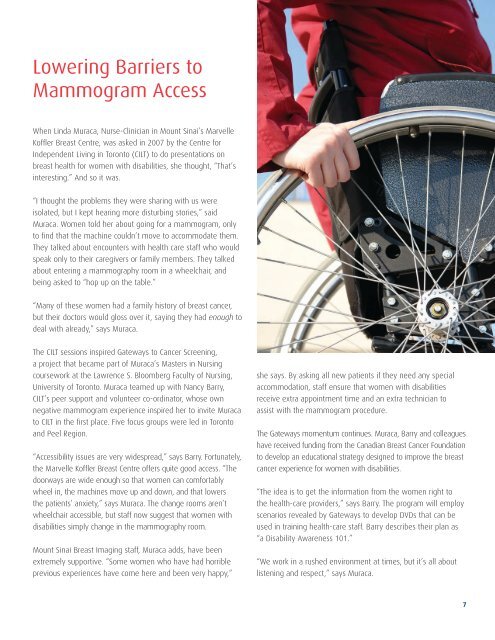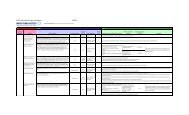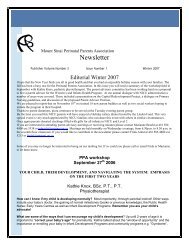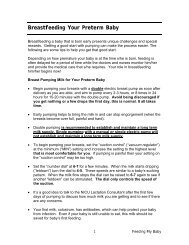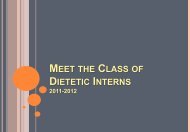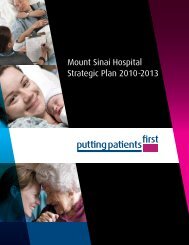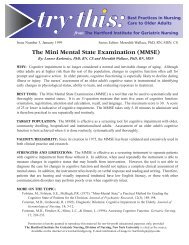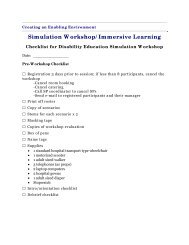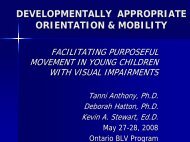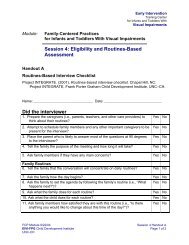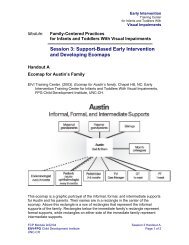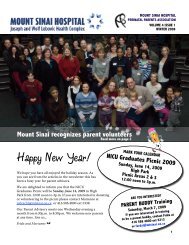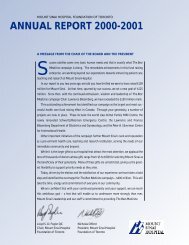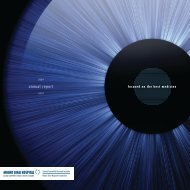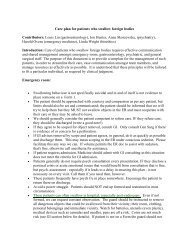Best Medicine Matters Fall 2009 - Mount Sinai Hospital
Best Medicine Matters Fall 2009 - Mount Sinai Hospital
Best Medicine Matters Fall 2009 - Mount Sinai Hospital
You also want an ePaper? Increase the reach of your titles
YUMPU automatically turns print PDFs into web optimized ePapers that Google loves.
Lowering Barriers to<br />
Mammogram Access<br />
When Linda Muraca, Nurse-Clinician in <strong>Mount</strong> <strong>Sinai</strong>’s Marvelle<br />
Koffler Breast Centre, was asked in 2007 by the Centre for<br />
Independent Living in Toronto (CILT) to do presentations on<br />
breast health for women with disabilities, she thought, “That’s<br />
interesting.” And so it was.<br />
“I thought the problems they were sharing with us were<br />
isolated, but I kept hearing more disturbing stories,” said<br />
Muraca. Women told her about going for a mammogram, only<br />
to find that the machine couldn’t move to accommodate them.<br />
They talked about encounters with health care staff who would<br />
speak only to their caregivers or family members. They talked<br />
about entering a mammography room in a wheelchair, and<br />
being asked to “hop up on the table.”<br />
“Many of these women had a family history of breast cancer,<br />
but their doctors would gloss over it, saying they had enough to<br />
deal with already,” says Muraca.<br />
The CILT sessions inspired Gateways to Cancer Screening,<br />
a project that became part of Muraca’s Masters in Nursing<br />
coursework at the Lawrence S. Bloomberg Faculty of Nursing,<br />
University of Toronto. Muraca teamed up with Nancy Barry,<br />
CILT’s peer support and volunteer co-ordinator, whose own<br />
negative mammogram experience inspired her to invite Muraca<br />
to CILT in the first place. Five focus groups were led in Toronto<br />
and Peel Region.<br />
“Accessibility issues are very widespread,” says Barry. Fortunately,<br />
the Marvelle Koffler Breast Centre offers quite good access. “The<br />
doorways are wide enough so that women can comfortably<br />
wheel in, the machines move up and down, and that lowers<br />
the patients’ anxiety,” says Muraca. The change rooms aren’t<br />
wheelchair accessible, but staff now suggest that women with<br />
disabilities simply change in the mammography room.<br />
<strong>Mount</strong> <strong>Sinai</strong> Breast Imaging staff, Muraca adds, have been<br />
extremely supportive. “Some women who have had horrible<br />
previous experiences have come here and been very happy,”<br />
she says. By asking all new patients if they need any special<br />
accommodation, staff ensure that women with disabilities<br />
receive extra appointment time and an extra technician to<br />
assist with the mammogram procedure.<br />
The Gateways momentum continues. Muraca, Barry and colleagues<br />
have received funding from the Canadian Breast Cancer Foundation<br />
to develop an educational strategy designed to improve the breast<br />
cancer experience for women with disabilities.<br />
“The idea is to get the information from the women right to<br />
the health-care providers,” says Barry. The program will employ<br />
scenarios revealed by Gateways to develop DVDs that can be<br />
used in training health-care staff. Barry describes their plan as<br />
“a Disability Awareness 101.”<br />
“We work in a rushed environment at times, but it’s all about<br />
listening and respect,” says Muraca.<br />
7


